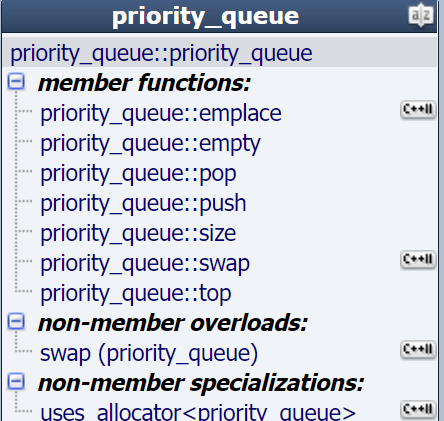关于priority_queue的随笔
简介
A standard container automatically sorting its contents.
模板参数:
_Tp – Type of element.
_Sequence – Type of underlying sequence, defaults to vector<_Tp>.
_Compare – Comparison function object type, defaults to less<_Sequence::value_type>. This is not a true container, but an adaptor. It holds another container, and provides a wrapper interface to that container. The wrapper is what enforces priority-based sorting and %queue behavior. Very few of the standard container/sequence interface requirements are met (e.g., iterators). The second template parameter defines the type of the underlying sequence/container. It defaults to std::vector, but it can be any type that supports front(), push_back, pop_back, and random-access iterators, such as std::deque or an appropriate user-defined type. The third template parameter supplies the means of making priority comparisons. It defaults to less<value_type> but can be anything defining a strict weak ordering. Members not found in normal containers are container_type, which is a typedef for the second Sequence parameter, and * push, pop, and top, which are standard %queue operations.
仅有的几个成员函数

一段使用的示例代码
#include <vector>
#include <queue>
#include <algorithm>
using namespace std;
struct Idea
{
int id; // Idea序号
int pm; // PM序号
int useTime; //花费时间
Idea(int id, int pm, int useTime) : id(id), pm(pm), useTime(useTime) {}
friend ostream &operator<<(ostream &os, const Idea &idea)
{
os << idea.id << endl;
return os;
}
};
struct cmp
{
// PM序号小在前面,序号相同时间少的在前面(堆排序)
bool operator()(const Idea &a, const Idea &b)
{
if (a.pm != b.pm)
return a.pm > b.pm;
else
return a.useTime > b.useTime;
}
};
int main()
{
priority_queue<Idea, vector<Idea>, cmp> priDeque;
priDeque.emplace(Idea(1, 1, 5));
priDeque.emplace(Idea(2, 1, 1));
priDeque.emplace(Idea(3, 0, 1));
priDeque.emplace(Idea(4, 0, 2));
priDeque.emplace(Idea(5, 2, 3));
while (!priDeque.empty())
{
Idea tmp = priDeque.top();
priDeque.pop();
std::cout << tmp;
}
std::cout << "************************************" << std::endl;
priority_queue<int> numbers;
numbers.emplace(5);
numbers.emplace(78);
numbers.emplace(12);
numbers.emplace(56);
numbers.emplace(4);
numbers.emplace(45);
while (!numbers.empty())
{
int tmp = numbers.top();
numbers.pop();
std::cout << tmp << " \t";
}
std::cout << std::endl;
return 0;
}
上述代码运行结果:

priority_queue不是容器,它是容器适配器,按照优先级自动对内部元素排序,默认的比较仿函数是less<value_type>,但是这样的结果是元素从大到小排序(TOP K问题使用它直接解决了)。它支持自定义比较函数。





【推荐】国内首个AI IDE,深度理解中文开发场景,立即下载体验Trae
【推荐】编程新体验,更懂你的AI,立即体验豆包MarsCode编程助手
【推荐】抖音旗下AI助手豆包,你的智能百科全书,全免费不限次数
【推荐】轻量又高性能的 SSH 工具 IShell:AI 加持,快人一步
· 阿里最新开源QwQ-32B,效果媲美deepseek-r1满血版,部署成本又又又降低了!
· 开源Multi-agent AI智能体框架aevatar.ai,欢迎大家贡献代码
· Manus重磅发布:全球首款通用AI代理技术深度解析与实战指南
· 被坑几百块钱后,我竟然真的恢复了删除的微信聊天记录!
· AI技术革命,工作效率10个最佳AI工具
2020-08-03 利用C/C++ 标准库获取系统当前时间